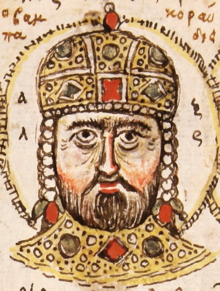
Back Alexios V Doukas Afrikaans Aleixo V Ducas AN ألكسيوس الخامس دوكاس Arabic الكسيوس الخامس دوكاس ARZ بئشینجی آلکسیوس AZB Аляксей V Дука Byelorussian Алексий V Дука Bulgarian Aleix V Ducas Catalan Alexios V. Czech Alexios 5. Doukas Danish
| Alexios V Doukas | |
|---|---|
| Emperor and Autocrat of the Romans | |
 Portrait of Alexios V from a 15th-century codex containing a copy of the Extracts of History by Joannes Zonaras | |
| Byzantine emperor | |
| Reign | 27 January – 12 April 1204 |
| Coronation | 5 February 1204 |
| Predecessor | Isaac II and Alexios IV |
| Successor | Constantine Laskaris (briefly?) Baldwin I (Latin Empire) Theodore I (Nicaea) Michael I (Epirus) Alexios I (Trebizond) Alexios III (Mosynopolis) Boniface I (Thessalonica) |
| Born | Date unknown |
| Died | December 1204 |
| Spouse | Philokalina[1] Eudokia Angelina |
| Dynasty | Angelos dynasty |
| Religion | Greek Orthodox |
Alexios V Doukas (Greek: Ἀλέξιος Δούκας; died December 1204), Latinized as Alexius V Ducas, was Byzantine emperor from February to April 1204, just prior to the sack of Constantinople by the participants of the Fourth Crusade. His family name was Doukas, but he was also known by the nickname Mourtzouphlos or Murtzuphlus (Μούρτζουφλος), referring to either bushy, overhanging eyebrows or a sullen, gloomy character.[2] He achieved power through a palace coup, killing his predecessors in the process. Though he made vigorous attempts to defend Constantinople from the crusader army, his military efforts proved ineffective. His actions won the support of the mass of the populace, but he alienated the elite of the city. Following the fall, sack, and occupation of the city, Alexios V was blinded by his father-in-law, the ex-emperor Alexios III, and later executed by the new Latin regime. He was the last Byzantine emperor to rule in Constantinople until the Byzantine recapture of Constantinople in 1261.